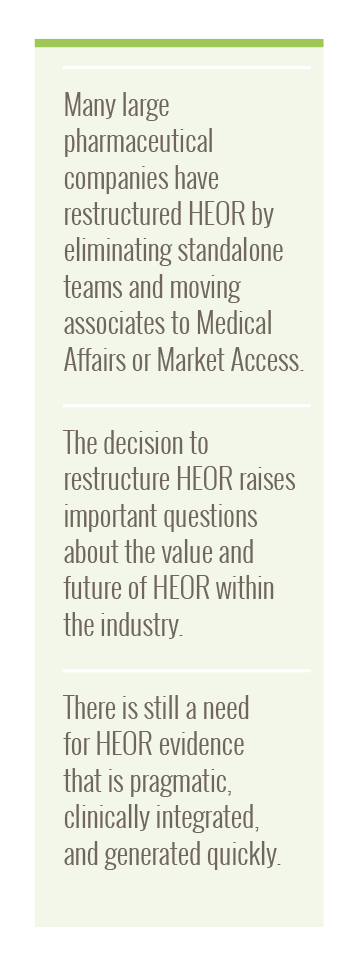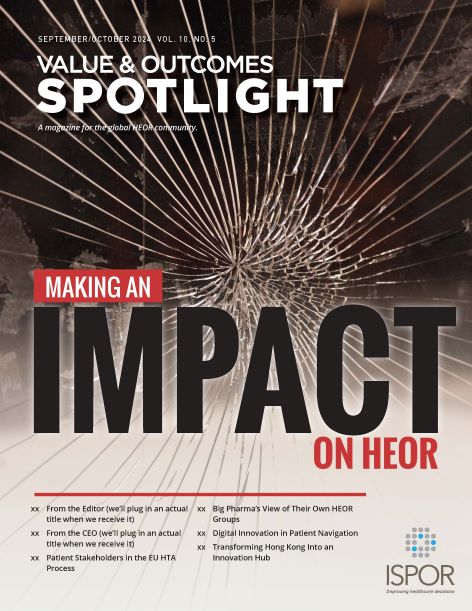Big Pharma Says, “Thanks, but No Thanks” to Its Own HEOR Groups
Scott D. Ramsey, MD, PhD, Curta, Inc, Fred Hutchinson Cancer Center, University of Washington, Seattle, WA, USA

Last spring, I had a wonderful time at the 2024 annual ISPOR conference in Atlanta, Georgia. I attended some fantastic sessions and caught up with many friends and colleagues. Overall, the vibe was very positive. Still, there was a darker undertone that was palpable: several very large pharmaceutical firms had substantially reorganized or eliminated their health economics and outcomes research (HEOR) groups. The story was remarkably similar for each of them: the HEOR leads were sacked and the midlevel employees were sent to other groups—most often Medical Affairs or Market Access.
"Is HEOR losing clout in pharma?"
So many things played through my mind as I heard these remarkably similar stories. Honestly, my first thought was how harsh the corporate world can be. Unlike my familiar world of academics, individual performance on the job is a second-order issue relative to the bottom line of corporate revenues. But this leads to another question: If a big company is facing tough times, how does it decide what is fat versus muscle? One person confided that they were pretty sure that the senior leadership simply drew a line, with those above the salary limit removed and those below kept (and scattered). If true, I think that Lester Thurow’s quote about bad business decisions might apply here:
“If a group of people has no sense where they came from, it is difficult for them to have a sense where they should go.”
One stream of thinking is that all this is much ado about nothing. Corporate restructuring is as regular as the seasons in big pharma. How would the sharp minds at McKinsey and Deloitte keep their very large salaries if they didn’t come up with ever better ways for companies to keep their edge? I am also mindful that the pharmaceutical industry, for all its weight and profit, is a tough industry. Many companies that initiated the layoffs had a number of pipeline drug failures, particularly in oncology, a space that I know well.
Moving beyond the ways that pharma adapts its business to product successes and failures, what does this all mean for those of us in HEOR? The obvious first question: Is HEOR losing clout in pharma? Certainly, HEOR groups in the United States face headwinds that are not issues in the rest of developed world. The US government has been unwelcoming to cost-effectiveness analysis, and most commercial insurers have not found a way for cost-effectiveness analysis to work in their business models. Of course, cost-effectiveness is only one component of HEOR’s purview. Could it be that all the other work they do has also been devalued? More on that in a moment.
"Are those of us who work in this space producing the type of information that companies need to support their products?"
A second related question came to mind: Maybe pharma doesn’t see a need to have separate HEOR groups? HEOR operates in a somewhat uncomfortable space in these companies. It is a science-based discipline but a hybrid of many fields of study: epidemiology, economics, modeling, patient reported outcomes, etc. The audience for HEOR-oriented studies is very broad and, perhaps for that reason, it doesn’t fit very well into typical pharma org charts. While there is a clear regulatory role for HEOR outside of the United States (ie, for health technology assessment) inside the United States, HEOR has no regulatory underpinnings and therefore ends up being used in other ways to bolster messages of comparative effectiveness, budget impact, and (yes) value compared to competitors. As such, HEOR studies can be particularly influential for products that face a lot of competition. And here is one reason why I found the pattern of the layoffs to be so strange: it takes years to build up the skills and experience that are needed to navigate HEOR. People who are at the top of this pyramid are very rare indeed. I think it will take years for pharma to realize that letting go of their most senior HEOR leaders was a grave mistake.
"The HEOR work isn’t going away."
My third question was more self-reflective: Are those of us who work in this space producing the type of information that companies need to support their products? Certainly, the public self-criticism that plagues our field is not helpful (eg, QALY-bashing). In my opinion, we also tend to add complexity instead of thinking how we could make a decision task easier, at least from the point of view of people who might want to use our work to make decisions. These issues don’t take away the fact that decision making is hard in medicine, with multiple attributes that must be weighed simultaneously. What we do—collect, synthesize, and summarize vast amounts of information into common, accepted frameworks—should not be discounted. Otherwise, it comes down to who can shout the loudest.
Will moving HEOR groups into Medical Affairs and Market Access change the field? While the essential products that HEOR provides may not change, the culture that our HEOR colleagues in pharma work in will.* My sense is that the speed of decision making in Medical Affairs and Market Access is much faster than most HEOR professionals are used to. Pharma’s HEOR teams and the large consultancy industry that supports them may need to live with a few more rough edges on their products and maybe a little less time asleep in their beds. In addition, US pharma is oriented to customers, not populations. Tailoring our work to address the tastes and preferences of pharma’s many customers will take some rethinking (hint: they won’t ask for more ways to characterize uncertainty). My personal expectation is that the winning formula will orient towards simpler, more clinically oriented models that place less emphasis on applying value weights to the endpoints.
Finally, here is one critical point that I took away from my discussions with persons who were impacted by the layoffs: the HEOR work isn’t going away. While it is too soon to tell (it takes months for organizations to “recover” from reorgs and downsizing), nobody I spoke with said that their projects were being eliminated. Also, when I look at the macro trends, it also doesn’t feel like HEOR is going into retreat any time soon. High-cost, low-value medicine hasn’t disappeared, nor have the healthcare cost pressures facing individual patients, businesses, and governments. Providers and insurers will still try to ferret out what isn’t necessary and do what they can to mitigate the cost burden of what is necessary in healthcare. As long as the organizations that pay for these products ask for the information that HEOR provides, pharma will be obliged to supply it.
HEOR is dead. Long live HEOR!
Note: A previous version of this article was first published in the June 2024 issue of Curta on Call, a quarterly blog from Curta’s Chief Medical Officer on current topics, trends, and issues in health economics and outcomes research.

